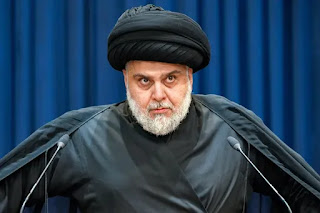Chaos in Iraq after Sadr called it quits
Photo source: Middle East Eye
By Naveed Qazi | Editor, Globe Upfront
In late August 2022, Muqtada al Sadr went on Twitter to announce his resignation from politics.
Sometime before, when Grand Ayatollah Kadhim al Haeri, whose followers contain a large number of Sadrists, had resigned as well, he had asked the Shia population to obey Iran’s leader, Ayatollah Ali Khomeini. For some watchers, this was seen as an attempt to weaken the Sadrist movement in Iraq.
After Sadr’s tweet, thousands of his followers stormed the Iraqi capital Green Zone, the Republican palace, and key government buildings in Baghdad. Since then, the Iraqi capital has witnessed strong intra Shia-confrontations, between Sadr’s supporters and variety of armed groups loyal to different factions, within the Shia Coordination Framework, a pro-Iran set of parties. Hundreds have been injured and tens killed. To save his reputation, Sadr apologised to the Iraqi people for the bloodshed.
As per an Oped by Hussein Ibish, Sadr’s political career didn’t start with an extraordinary example. He wrote: ‘Sadr’s career has been built on the legacy of his father and uncle, two of the most revered Shiite religious authorities of their generation. While he lacks their erudition and religious credentials, and had no governmental experience, Sadr succeeded in building religious and political authority in tandem, each complementing the other. And that has made him a remarkably toxic figure in contemporary Iraq.’
Since prevailing in October 2021 elections, Sadr has been failing wildly to convert his political hindsight into practical political power. He's not entirely at fault, as his pro-Iranian Shiite rivals are more reckless, dangerous and violent, while Kurdish groups are hopelessly divided, and Sunni factions are split largely between groups aligned with different Gulf Arab patrons.
As a reaction, neighbouring Iran announced it was closing all land borders with Iraq until further notice and warned citizens not to travel to Iraq, as the country was working to return Iranian visitors home safely. Tehran’s international airport suspended flights to Baghdad. Millions of Iranian pilgrims travel to Iraq every year to visit historic shrines at the heart of Shiite Muslim identity.
Al-Kadhimi, the prime minister suspended cabinet sessions until further notice. In an appeal to Sadr, he said perpetuating political disputes ‘to the point of damaging all state institutions does not serve the Iraqi people, their aspirations, their future and their territorial integrity.’ He even expressed regret that the political conflict had reached the level of the use of weapons among Iraqi factions.
Going back to Iraq’s October 2021 parliamentary elections, Sadr emerged with the single largest number of seats. He allied with other two major winners of the election: the Sunni Sovereignty Alliance and the Kurdistan Democratic Party. At that time, Sadr’s attempt at government formation faced strong resistance, mainly from the Coordination Framework. As per an Oped by Kamaran Palani on Al Jazeera: ‘This bloc has been calling for the continuation of the classical post-2003 consensus model of governance, under which an administration effectively needs to enjoy a two-thirds majority, and not just a simple one, to rule. While this grouping didn’t win anywhere close to the numbers itself, it had enough seats in parliament to block the Sadrists from claiming the support of two-thirds of the legislature.’
Then, in February 2022, the Iraqi supreme court, being carried away by Iranian influence, interpreted the Iraqi constitution in a way that turned the need for a two-thirds majority into an edict. Effectively, this means that any Iraqi government must be an administration of consensus, a failed approach that escalated violence in Iraq. But, Sadr is adamant on a post 2003 system.
As Sadr failed to form the government, he shocked everyone by ordering seventy-three of his lawmakers to resign from parliament in June 2022. That was a huge mistake. According to Palani, his political strength against his rivals within the Shia community comes from two main cards: his seats in parliament and the loyalty of his strong and disciplined base. But, his clerical and rabble-rousing qualities didn't let him have a firm understanding of the economic and patronage gamesmanship involved in government formation in a parliamentary system.
That’s why the elections themselves won’t solve Iraq’s political dysfunction, as there is no common ground between Sadrists and Coordination Framework. After Sadr’s resignation, he no doubt will have no say in the parliament but his hold over common people on streets means that he can bring down any government in Baghdad. Some analysts also believe that his resignation is temporary, and that he might brace himself for next elections, as he has said this several times before as well. That means he lies for political gains, and Iraq seems to be paying the price.




Comments
Post a Comment
Advice from the Editor: Please refrain from slander, defamation or any kind of libel in the comments section.